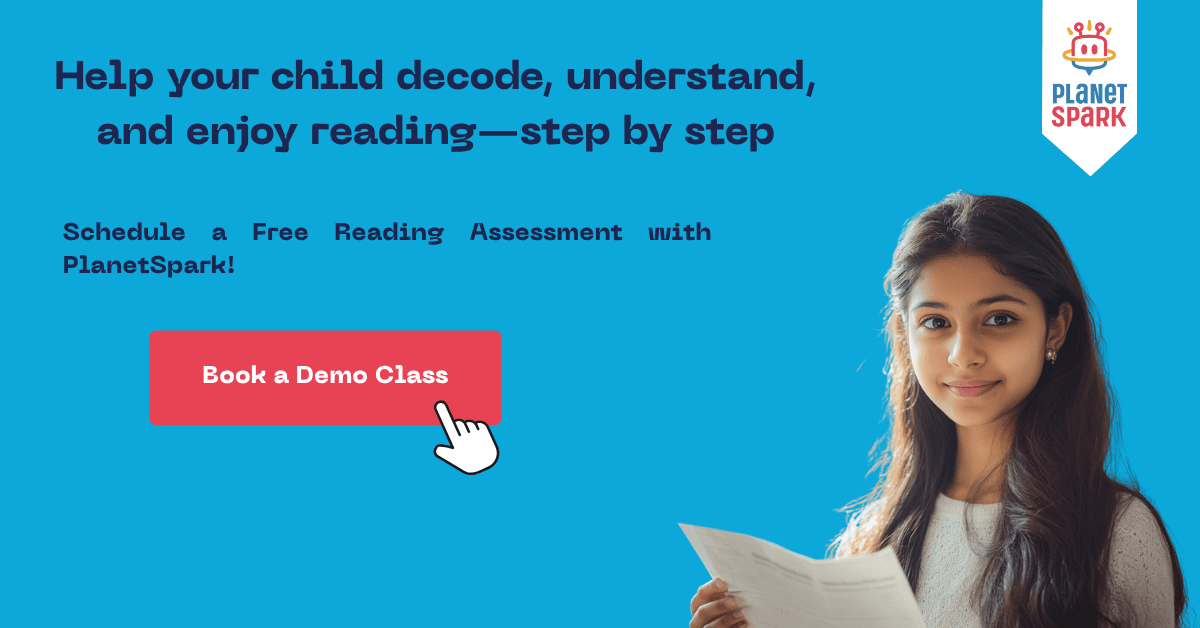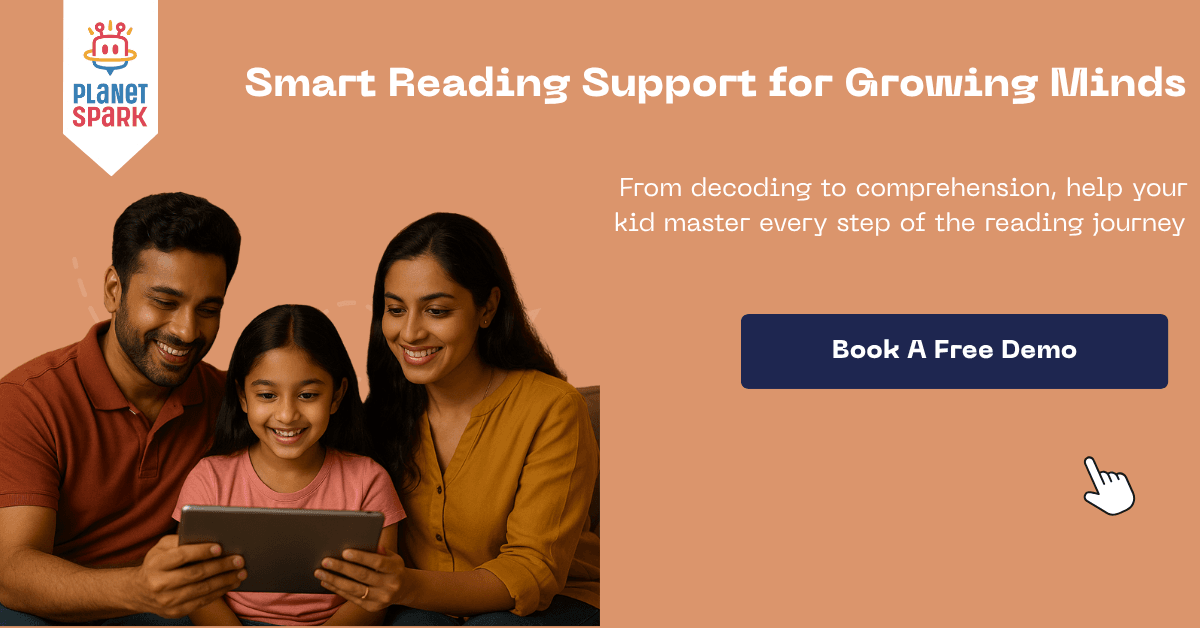Reading Difficulties in Children: Signs & Solutions
Last Updated At: 8 Jul 2025
7 min read

Despite working hard on early literacy to make reading easier for your child, you may find them struggling with elementary reading skills. Experts say that most children who get timely help with reading difficulties gain fluency and comprehension soon. On the other hand, if a child is not offered support for improving reading skills – it may impact their learning for life.
The development of reading habits from an early age helps children do better at school, expand their vocabulary, and enhance their confidence. The first step in helping children overcome their reading difficulties is identifying the issues they are struggling with.
From storybooks to games and quizzes, PlanetSpark's program keeps reading fun and interactive.

5 Most Common Reading Problems Among Children
Decoding Issues or Problems with Sounding Out Words
Decoding issues can be understood as the problem of associating sounds with the written alphabet. Beginner readers struggle with new or unfamiliar combinations of letters. Still, by practising phonics and reading aloud, decoding can be made easy.
Difficulty in Comprehension
Reading involves comprehension at various levels. It includes alphabet recognition, understanding the meaning of different words and phrases, and comprehending the text at a sentence and paragraph level. Poor comprehension skills make reading cognitively challenging. It can also demotivate a child from developing a reading habit.
Mixed Difficulties
Children may have mixed difficulties that prevent them from reading well. This mixture of problems can include decoding, comprehension, phonemic challenges, or physical impairments such as dyslexia.
Retention Difficulties
Good retention skills include high-level cognitive abilities, memory, and the ability to group and retrieve related ideas. From the third grade onwards, memorizing is an integral part of schoolwork. But retention or committing what you read to memory can be a challenge for some children.
Speed
As students reach higher reading levels, they improve their vocabulary in English, get better at reading comprehension and retention. All this helps in increasing the reading speed of your child. If reading speed does not improve as the reading level progresses, the child may have a slow processing issue with cognitively demanding tasks like reading.
Now that we are familiar with the different a child may face let’s look at some strategies that can help.
Causes of Reading Difficulties in Children
There is no single cause for reading difficulties. The most common contributing factors include:
Dyslexia: Dyslexia is the most well-known reading disorder, affecting approximately 10–15% of children. It primarily impacts phonological processing—making it difficult for children to connect sounds with letters.
- Language Processing Disorders: Children who struggle to understand and process spoken language may also struggle to make sense of written language.
- ADHD and Attention Issues: Reading requires sustained attention and focus. Children with ADHD may have trouble following text, remembering what they read, or staying engaged during reading activities.
- Limited Phonemic Awareness: Phonemic awareness is the ability to hear, identify, and manipulate sounds in words. A lack of this awareness makes decoding new words very challenging.
- Vision or Hearing Problems: Unidentified issues with hearing or vision can significantly impair a child's ability to learn to read effectively.
- Lack of Exposure: Children who grow up in environments with limited access to books or language-rich experiences may struggle with vocabulary, fluency, and comprehension.
Worried your child might be facing reading challenges?
Don’t wait for them to fall behind. Let our experts identify the cause and create a personalized reading improvement plan.Book a free demo class and see the difference yourself!
7 Techniques That Help Children Overcome Reading Difficulties
Memorize Sight Words & Environmental Cues
This is a fluency strategy that helps children recall words faster to improve overall fluency in English. Use flashcards to memorize sight words or names of everyday things that appear in the child’s surroundings. If the child can recall more words this way, it improves vocabulary and fluency.
Activate Ideas & Thinking Strategies
To encourage a reading habit, discuss what you are about to read by activating a child’s prior knowledge of the subject. Showing pictures, mind-maps, titles, or skimming the text helps children get the central idea of the text they will read and improves comprehension.
Build Vocabulary
Building a broad vocabulary can help children recognize more words as they read. Some ideas for improving vocabulary in English include providing glossaries, pre-teaching key terms before reading, and using flashcards. Learning words in context also makes them easier to remember.
Reciprocal Teaching
Reciprocal teaching is an excellent technique to reinforce the understanding of concepts taught to a child or enhance the comprehension of a text they have read. Assign different roles such as questioner, summarizer, clarifier, and predictor to help initiate the discussion and give students a leadership role in their learning process.
Visual Imagery & Audiobooks
For children who respond better to visual cues, choose books that have detailed illustrations alongside written text. You could also ask the child to draw a picture of what they understand from a reading text. Secondly, buy audiobooks as an accompaniment to hard copies of books. Encourage your child to read along as they listen to the book.
The Dolch List
Teaching children words that repeatedly appear across children’s worksheets and textbooks can help them decode the text faster. The Dolch list consists of high-frequency terms that commonly occur in children’s books.
Does Your Child Need Extra Help?
Lastly, the most essential thing for a parent is to take involvement in your child’s daily reading practice and observe their reading pattern to find out if your child needs help. You can also talk to the teachers in school to know their observations or visit a pediatrician who can comment on the child’s cognitive development.
How PlanetSpark Helps Children Overcome Reading Challenges
PlanetSpark’s reading and phonics programs are designed by experts in child education and literacy development. Here’s how we help:
Phonics-Based Learning: Synthetic phonics approach to teach decoding, blending, and sound recognition step-by-step.
Live, Interactive Reading Practice: Daily sessions with real-time correction, story reading, and comprehension exercises.
Certified Literacy Coaches: 1:1 coaching by experts trained in communication and child psychology.
Integrated Vocabulary & Grammar
Contextual vocabulary and grammar taught through games, dialogues, and writing tasks.Reading + Speaking Integration"Children present what they read—boosting comprehension, expression, and fluency.
Instant Feedback & AI Reports: Real-time pronunciation correction and personalized progress tracking.
Confidence-Building Environment: Fun reading games, peer interactions, and praise-driven motivation to eliminate reading anxiety.
Conclusion
If you are a parent with a child who is facing reading difficulties, you are not alone. Many students face reading challenges at the beginner level. It is essential to seek timely interventions to maximize your child’s opportunities for success. Offering the proper support to your child when they need it the most can help your child gain confidence and learn new skills with a positive attitude.

More useful links:
Books Reading Course for Beginners Kids
Frequently Asked Questions
Q. What are the early signs of reading difficulties in children?
A. Common signs include trouble recognizing letters, difficulty sounding out words, skipping lines while reading, avoiding reading tasks, and poor comprehension despite reading fluently.
Q. Can reading difficulties be corrected with proper training?
A. Yes. With early intervention and structured phonics-based instruction, most children can overcome reading challenges and become confident readers.
Q. How does PlanetSpark help children who struggle with reading?
A. PlanetSpark uses a research-backed synthetic phonics approach, live reading practice, certified literacy coaches, and AI-powered fluency reports to help children build reading skills step by step.
Q. What age group does PlanetSpark’s reading program support?
A. PlanetSpark supports children aged 4 to 14 ranging from beginners to those needing reading intervention due to fluency or comprehension issues.
Q. My child reads well but doesn’t understand what they read. Can PlanetSpark help?
A. Absolutely. We integrate vocabulary, grammar, and oral expression to boost reading comprehension—helping kids not just read words but understand and use them.
Q. How can I enroll my child in the PlanetSpark reading program?
A. You can book a Free Trial Class to experience our approach firsthand. Our expert educators will assess your child and recommend the right learning path.
Personalized Communication Report
Record a video to get a AI generated personalized communication report for your child
Select Learner's Class

Hi There, want to try these
tips for your child with
LIVE with our expert coach?
Let's check your child's
English fluency
